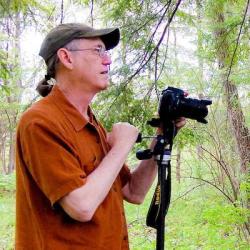
Sen. Mike Braun introduced Senate Bill 2990 to establish the Benjamin Harrison National Recreation Area and increase the federally protected wilderness area by Lake Monroe. | Courtesy photo
The Charles C. Deam Wilderness Area would more than double in size under legislation introduced in Congress by Sen. Mike Braun.
The bill would also designate another 29,000 acres of Hoosier National Forest land as the Benjamin Harrison National Recreation Area (NRA), which would be managed to protect Lake Monroe water quality and emphasize recreation.
Braun was scheduled to personally announce the bill at an Indiana Forest Alliance (IFA) meeting at the Story Inn in Brown County on September 30, but he was forced to stay in Washington due to the threatened government shutdown. His chief of staff, Josh Kelley, made the announcement instead.
In a news release, Braun, a Republican from Jasper, Indiana, said, “The area this legislation will protect is important, not only for its ecological significance, but also for the drinking water which the Monroe Reservoir provides to so many Hoosiers in the area.”
The bill, which must be approved by the U.S. Senate and House and signed by Pres. Joe Biden, would add 15,300 acres to the 12,953-acre Deam. This would be the first expansion of Indiana’s only federally protected wilderness since its creation in 1982.
The Deam is located on the southern shore of Lake Monroe east of the State Road 446 Causeway. It includes acreage in Monroe, Brown, Jackson, and Lawrence counties and extends south to Hunter’s Creek Road and east to Maumee Road.
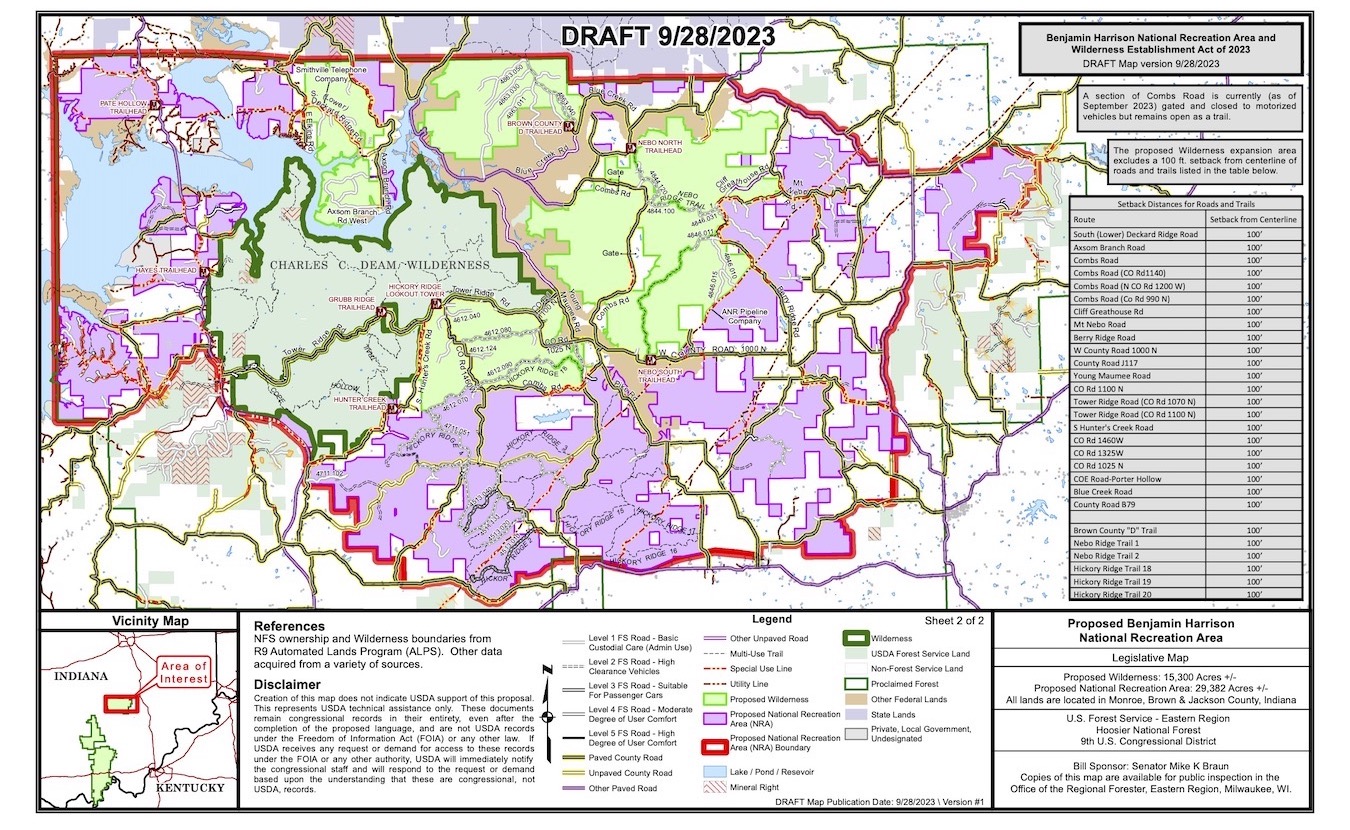
This Legislative Map shows the Charles C. Deam Wilderness Area’s 12,953 acres (dark green), the 15,300 acres of proposed new wilderness (light green), and the 29,000-acre Benjamin Harrison National Recreation Area (lavender). | Source: U.S. Forest Service
Braun’s legislation would add backcountry acreage to the wilderness’s north, east, and southeast perimeters, including Nebo Ridge, Browning Mountain, Porter Hollow, Bad Hollow, Panther Creek, and other areas preservationists have long coveted.
Nebo was the namesake for a 32,000-acre proposal from the Indiana Public Interest Research Group (InPIRG) in the dawning days of the wilderness debate in the mid-1970s. Politics and opposition to the Nebo Ridge Wilderness Area eventually whittled it down to less than half of the InPIRG plan.
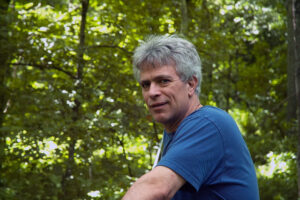
Jeff Stant, executive director of the Indiana Forest Alliance, spearheaded efforts to create the Deam Wilderness Area in 1982 and the effort to expand it today. | Photo by Steven Higgs
Logging and other destructive uses are not now prohibited in the expansion areas, said Jeff Stant, executive director of the Indiana Forest Alliance.
“Once this bill becomes law, the Deam will be more than twice its current size, saving thousands of acres of precious wildlife habitat and encompassing such striking natural features as Browning Mountain and Nebo Ridge,” he said.
The six mountain-biking trails on Nebo Ridge would receive easements to allow their continued use, Stant said.
The proposed Harrison Recreation Area would join 40 other NRAs that are located near major reservoirs with water-based recreational opportunities. Such properties are managed by the National Park Service, Bureau of Land Management, and Forest Service. Indiana has no NRAs.
The Harrison’s 29,000 acres would effectively surround the Deam and its proposed expansion on all sides. It would encompass several popular Hoosier National Forest recreation sites, from Pate Hollow Trail to the northwest, to Hardin Ridge Recreation Area (not an NRA) to the west, to Hickory Ridge Horsecamp to the south, and to Sundance Lake to the east.
The National Forest System is managed by the U.S. Department of Agriculture. And the bill would establish a committee, to be appointed by the U.S. Secretary of Agriculture, to develop a management plan that would emphasize two legislative priorities for the Harrison NRA, Stant said.
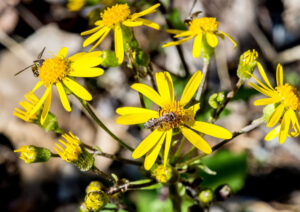
The expanded wilderness area will save thousands of acres of precious wildlife habitat and protect Lake Monroe water quality, said Jeff Stant. | Photo by Steven Higgs
“They are to be managed to protect the water quality of Monroe Reservoir and that water supply,” he said. “And they are to be managed to promote recreation.”
Braun’s bill says the committee would have to produce a special management plan to achieve those objectives within five years of the act’s passage.
The bill would allow the Forest Service to “manipulate vegetation,” including timber harvesting, in the Harrison NRA, with limits, Stant said.
“No, it won’t preclude logging,” he said. “But the logging can’t harm the Monroe Reservoir water quality. And they have to be able to demonstrate that. And it should not trump the emphasis on recreation.”
The controversial Houston South Vegetation Management and Restoration Project lies in the proposed Harrison NRA, and Stant said its establishment would give opponents “leverage” in their efforts to stop it. Houston, pronounced How-stun, has been temporarily stopped by the courts in response to lawsuits filed by a variety of groups and governmental organizations, including IFA.
But the Deam/Harrison expansions will face a long and difficult road, Stant said. It will have to pass both houses of Congress, ideally before Braun, who is running for governor in 2024, leaves the Senate at the end of the year.
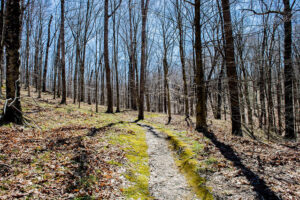
The legislation would add backcountry acreage, including Nebo Ridge (above), to the north, east, and southeast perimeters of the Deam Wilderness. | Photo by Steven Higgs
And there will be opposition as the process goes forward, he said.
“We’re going to need a lot of help,” he said. “… We’re just going to have to work hard to get a groundswell going.”
Stant praised Braun’s leadership on the issue.
“We are very thankful to Senator Braun for spearheading this historic legislation, which will establish the largest area of protected wild forests in the history of Indiana,” he said.
Braun said he was “proud” to work with the IFA and other groups “to ensure Indiana’s natural spaces receive the respect and care they deserve.”
And, the senator said, his involvement is personal.
“As an avid conservationist and outdoorsman, the Hoosier National Forest holds a special place in my heart,” he said. “And by expanding the wilderness and National Recreation Area around Nebo Ridge, we can ensure these portions of the forest are preserved for future generations to enjoy.”
[Editor’s note: This article has been updated to include information about the mountain-biking trails on Nebo Ridge.]


